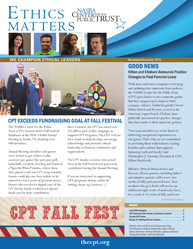Lead With Integrity: Recognizing the Problem (Nov./Dec. 2016)
Ethics Matters
November – December 2016
 For several years, I have talked with college students about overcoming ethical dilemmas early in their careers. I am aware of many situations where young professionals have been pulled into unethical situations, because they did not recognize them until it was too late. To my surprise, in recent conversations with seasoned professionals, I learned that failure to recognize questionable or unethical activity is not limited to students and young professionals. Therefore, I am convinced that recognizing the problem is something we all need to do well.
For several years, I have talked with college students about overcoming ethical dilemmas early in their careers. I am aware of many situations where young professionals have been pulled into unethical situations, because they did not recognize them until it was too late. To my surprise, in recent conversations with seasoned professionals, I learned that failure to recognize questionable or unethical activity is not limited to students and young professionals. Therefore, I am convinced that recognizing the problem is something we all need to do well.
In any challenging situation we face, the first step to resolving a problem is recognizing it. We acknowledge this thought with personal and behavioral issues. Based on what I am observing, we benefit by applying this same mindset to our careers. Whether being slowly pulled into long-standing, bad behavior or being surprised by something that simply does not seem right, we need to be aware of what we are doing and being asked to do.
So, how do we recognize inappropriate activity? There are several things we can do to raise our awareness of bad behavior. One is to pay attention to our intuition. After all, our intuition is our subconscious mind using past experiences and knowledge gained to make conclusions. We cannot completely depend on intuition to make final decisions, but trusting it to start the recognition process is wise. Once our intuition awakens us, we then need to be more attentive. We can discover problem areas by paying attention to what people say to ensure their words line up with what we believe to be ethically sound. Part of being attentive and being a leader involves asking the appropriate questions to gain greater understanding. A well-positioned question can increase one’s knowledge and thwart a potentially damaging unethical situation.
I just outlined three ways we can strengthen our problem recognition skills. It is important that we grow our ability to do so. Using appropriate levels of professional skepticism will enable us to be aware, but not build trust barriers among our coworkers and other stakeholders. Sincere efforts to recognize problems before they escalate can lead to success, mitigate damage and grow our businesses.
I challenge you to make the mental shift. Are you aware of what’s happening around you?
— As Always, Lead With Integrity!
Alfonzo Alexander
President, CPT
CRO, NASBA
